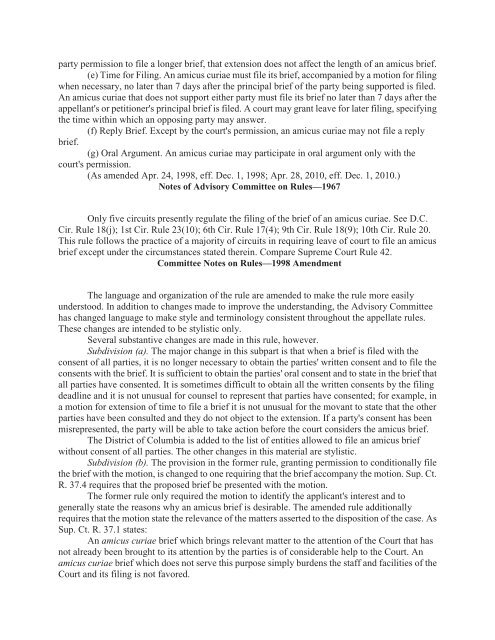Federal Rules of Appellate Procedure 2014-2015, 2014a
Federal Rules of Appellate Procedure 2014-2015, 2014a
Federal Rules of Appellate Procedure 2014-2015, 2014a
You also want an ePaper? Increase the reach of your titles
YUMPU automatically turns print PDFs into web optimized ePapers that Google loves.
party permission to file a longer brief, that extension does not affect the length <strong>of</strong> an amicus brief.<br />
(e) Time for Filing. An amicus curiae must file its brief, accompanied by a motion for filing<br />
when necessary, no later than 7 days after the principal brief <strong>of</strong> the party being supported is filed.<br />
An amicus curiae that does not support either party must file its brief no later than 7 days after the<br />
appellant's or petitioner's principal brief is filed. A court may grant leave for later filing, specifying<br />
the time within which an opposing party may answer.<br />
(f) Reply Brief. Except by the court's permission, an amicus curiae may not file a reply<br />
brief.<br />
(g) Oral Argument. An amicus curiae may participate in oral argument only with the<br />
court's permission.<br />
(As amended Apr. 24, 1998, eff. Dec. 1, 1998; Apr. 28, 2010, eff. Dec. 1, 2010.)<br />
Notes <strong>of</strong> Advisory Committee on <strong>Rules</strong>—1967<br />
Only five circuits presently regulate the filing <strong>of</strong> the brief <strong>of</strong> an amicus curiae. See D.C.<br />
Cir. Rule 18(j); 1st Cir. Rule 23(10); 6th Cir. Rule 17(4); 9th Cir. Rule 18(9); 10th Cir. Rule 20.<br />
This rule follows the practice <strong>of</strong> a majority <strong>of</strong> circuits in requiring leave <strong>of</strong> court to file an amicus<br />
brief except under the circumstances stated therein. Compare Supreme Court Rule 42.<br />
Committee Notes on <strong>Rules</strong>—1998 Amendment<br />
The language and organization <strong>of</strong> the rule are amended to make the rule more easily<br />
understood. In addition to changes made to improve the understanding, the Advisory Committee<br />
has changed language to make style and terminology consistent throughout the appellate rules.<br />
These changes are intended to be stylistic only.<br />
Several substantive changes are made in this rule, however.<br />
Subdivision (a). The major change in this subpart is that when a brief is filed with the<br />
consent <strong>of</strong> all parties, it is no longer necessary to obtain the parties' written consent and to file the<br />
consents with the brief. It is sufficient to obtain the parties' oral consent and to state in the brief that<br />
all parties have consented. It is sometimes difficult to obtain all the written consents by the filing<br />
deadline and it is not unusual for counsel to represent that parties have consented; for example, in<br />
a motion for extension <strong>of</strong> time to file a brief it is not unusual for the movant to state that the other<br />
parties have been consulted and they do not object to the extension. If a party's consent has been<br />
misrepresented, the party will be able to take action before the court considers the amicus brief.<br />
The District <strong>of</strong> Columbia is added to the list <strong>of</strong> entities allowed to file an amicus brief<br />
without consent <strong>of</strong> all parties. The other changes in this material are stylistic.<br />
Subdivision (b). The provision in the former rule, granting permission to conditionally file<br />
the brief with the motion, is changed to one requiring that the brief accompany the motion. Sup. Ct.<br />
R. 37.4 requires that the proposed brief be presented with the motion.<br />
The former rule only required the motion to identify the applicant's interest and to<br />
generally state the reasons why an amicus brief is desirable. The amended rule additionally<br />
requires that the motion state the relevance <strong>of</strong> the matters asserted to the disposition <strong>of</strong> the case. As<br />
Sup. Ct. R. 37.1 states:<br />
An amicus curiae brief which brings relevant matter to the attention <strong>of</strong> the Court that has<br />
not already been brought to its attention by the parties is <strong>of</strong> considerable help to the Court. An<br />
amicus curiae brief which does not serve this purpose simply burdens the staff and facilities <strong>of</strong> the<br />
Court and its filing is not favored.


















